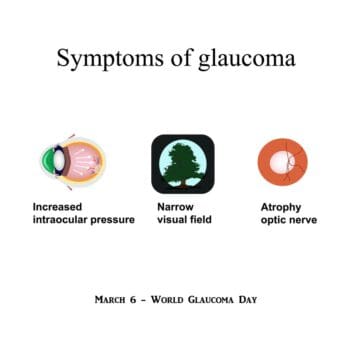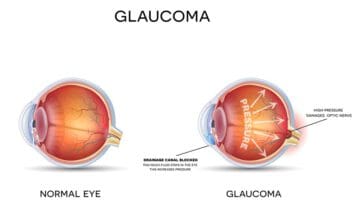Medications to Avoid with Glaucoma
Home / Diagnosed With Glaucoma /
Last Updated:
There are many over-the-counter (OTC) and prescription medications that can increase your risk for glaucoma or worsen the condition if you already have it.
Table of Contents
Glaucoma medications often have many adverse side effects that can be both eye-related and systemic (impacting the bodily system).
Treatments for glaucoma have vastly improved throughout history. There are many medications that seemed helpful in the past that are no longer deemed beneficial.
There is no cure for glaucoma, but medications can keep your vision from getting worse and help to manage symptoms.
Medications That Can Worsen Glaucoma

There are a few forms of glaucoma, and it is important to know which type you suffer from in order to better understand how medications can impact the condition. The most common form of glaucoma is open-angle glaucoma. Another less common form is angle-closure glaucoma.
If you have open-angle glaucoma, oral steroids can increase your eye pressure to dangerous levels. They should only be taken in short courses or avoided altogether. These medications are often used to reduce inflammation for allergies, asthma, joint and muscle conditions, and autoimmune diseases.
You deserve clear vision. We can help.
With 135+ locations and over 2.5 million procedures performed, our board-certified eye surgeons deliver results you can trust. Your journey to better vision starts here.
With angle-closure, or closed-angle, glaucoma, it is important to stay away from medications that can dilate (widen) your pupil. These include:
- Tricyclic antidepressants.
- Decongestants and antihistamines.
- Medications for motion sickness.
- Asthma medications.
These medications can potentially worsen glaucoma and lead to dangerous complications.
Adverse Reactions to Glaucoma Medications
One of the front-line treatments for glaucoma is medication, often in the form of eye drops. Glaucoma medications can have a range of side effects based on the active and inactive ingredient in them.
Many glaucoma eye drops contain the preservative benzalkonium chloride, which can cause a host of eye problems, including:
- Conjunctival allergy.
- Corneal erosion.
- Conjunctival injection.
- Superficial punctate keratitis.
- Anterior chamber inflammation.
Preservatives can increase the shelf-life of a medication, but they can also cause more eye problems. Often, it is best to avoid medications with this inactive ingredient.
Other medications, such as beta blockers, can impact the entire body on a systemic level, not just the eyes.
These are typical glaucoma medications and their potential side effects:
- Beta blockers: low pulse and blood pressure, shortness of breath, and fatigue
- Prostaglandin analogs: growth of the eyelashes and darkening of eyelid skin, changing eye color, redness and/or stinging in the eye, droopy eyelids and sunken eyes, and itchiness
- Carbonic anhydrase inhibitors: as an eye drop: eye irritation, stinging, eye pain, and burning; in pill form: upset stomach, memory issues, tingling in extremities, and frequent urination
- Alpha agonists: allergic reaction, dry mouth and nose, drowsiness, fatigue, headache, and stinging or burning
- Rho kinase inhibitors: corneal deposits, stinging, bleeding in the whites of the eye, and eye redness
Keep in mind that these are potential side effects of these medications. They do not happen to everyone. Talk to your doctor about the benefits and risks of glaucoma medications for your specific condition.
You deserve clear vision. We can help.
With 135+ locations and over 2.5 million procedures performed, our board-certified eye surgeons deliver results you can trust. Your journey to better vision starts here.
Medications That Are No Longer Useful

Treatments for glaucoma have advanced throughout the years with innovations in scientific research and technology. Current treatments generally include medications, usually as eye drops, although a combination of oral and topical medications can be beneficial as well as laser treatments.
Medications for glaucoma have come a long way. These treatments are no longer used and should now be avoided when treating glaucoma:
- Dibenamine: This adrenergic antagonist had to be administered intravenously (IV) and caused orthostatic hypotension and even death in some cases.
- Topical epinephrine: This medication had both systemic and topical side effects. It was discontinued in 80 percent of patients due to risks outweighing the potential benefits.
- Dipivefrin: This adrenergic agonist was applied topically and caused significant allergic reactions. It was discontinued in the U.S. as a result.
- Beta-adrenergic antagonists: These were used up until the medication timolol became available. These medications caused reduced tear production, corneal anesthesia, and tachyphylaxis.
Lowering Your Risk
When taking glaucoma medications, it is important to discuss anything else you take with your doctor to avoid any potential interactions that can cause complications. You will need to take medications exactly as directed to reduce the odds for problems.
If you experience any side effects or vision changes, be sure to let your doctor know right away. Lowering your dosage or changing medications can help.
Medications do not improve your vision once you have glaucoma. They can help to keep the pressure in your eyes lower and the fluid in your eyes to drain better. This can keep your vision from getting worse and creating more vision problems. If you stop taking your glaucoma medications, you could lose your vision.
Talk to your doctor about your medical history to determine the right treatment options for you. Together, you can determine what glaucoma medications might be most effective and which ones you should avoid completely.
You deserve clear vision. We can help.
With 135+ locations and over 2.5 million procedures performed, our board-certified eye surgeons deliver results you can trust. Your journey to better vision starts here.
References
- Glaucoma. (July 2020). National Eye Institute (NEI).
- Closed-Angle Glaucoma: Medications to Avoid. (December 2019). University of Michigan Health System (UMHS).
- Managing Adverse Effects of Glaucoma Medications. (May 2014). Clinical Ophthalmology.
- Glaucoma Medications and Their Side Effects. (July 2018). Glaucoma Research Foundation.
- Tracing History of Glaucoma Drugs. (March 2019). Ophthalmology Times.
- Glaucoma Medications. (June 2019). National Eye Institute (NEI).
This content is for informational purposes only. It may have been reviewed by a licensed physician, but is not intended to serve as a substitute for professional medical advice. Always consult your healthcare provider with any health concerns. For more, read our Privacy Policy and Editorial Policy.